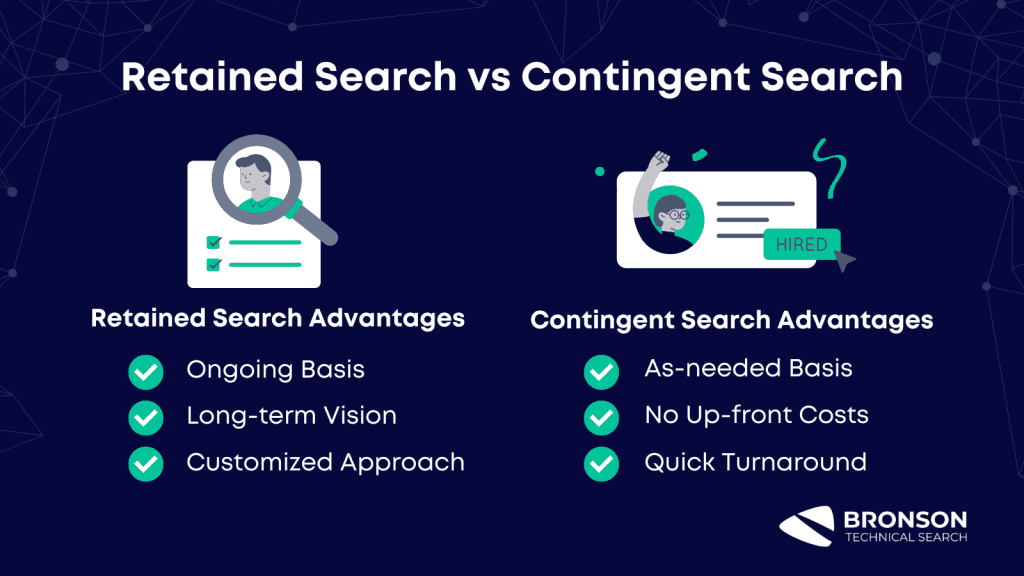
In their hunt for top-tier talent, businesses often face the difficult decision of choosing between retained search and contingent search firms.
While both serve the purpose of finding top-tier candidates for various positions, they operate on distinct models with unique advantages and disadvantages.
In this article, we delve into the concept of retained search firms, shedding light on what they entail, their benefits, and how they differ from contingent search firms.

Why Are Employers Increasingly Working With Search Firms?
North American employers are confronting an unparalleled talent shortage, hitting a 17-year-high in 2024. This scarcity spans various sectors and industries, with the demand for AI skills notably pronounced.
To overcome this challenge, employers are turning to search firms with exclusive candidate networks and a deeper understanding of the job market to fill vacancies across their organizations.
What is a Retained Search Firm?
A retained search firm, also known as retained executive search or retained recruiting, is a specialized agency hired by organizations to identify and recruit top-level executives and professionals for key positions within the company.
Unlike contingent search firms, which usually work on a “no-win, no-fee” basis and are paid only upon successful placement, retained search firms are engaged on a retainer basis. This means that the client pays an upfront fee for exclusive access to the firm’s services, regardless of the outcome.
What is a Retained Search Firm?
- Dedicated Attention: With a retainer in place, retained search firms are fully committed to the client’s needs. They invest considerable time and resources into understanding the company’s culture, requirements, and long-term goals, ensuring a tailored approach to recruitment.
- Access to Top Talent: Retained search firms leverage their extensive networks and industry expertise to identify and attract top-tier candidates who may not be actively seeking new opportunities. They focus on quality over quantity, prioritizing candidates who are the best fit for the role and the organization.
- Confidentiality: Retained search engagements often involve sensitive or high-profile positions where confidentiality is paramount. These firms prioritize discretion throughout the recruitment process, safeguarding the client’s reputation and minimizing the risk of sensitive information leakage.
Benefits of Retained Search for Hiring Executive Talent
When you work with an executive search firm on a retainer basis, they become intimately familiar with your organization. Retained executive search firms can better understand the following:
- Long-term vision and executive recruitment needs;
- Near-term project-based staffing needs;
- Challenges with previous hires;
- Addressing diversity and inclusion goals;
- Demographic makeup of your employees;
- Your organization’s mission and business goals;
- Your company’s culture and the unique qualities that make a candidate a good fit.
All of these are crucial in the hyper-competitive race for executive talent.
In addition, a retained executive search firm can help you better understand the shifting job market, latest trends in compensation, where talent hubs are located, and more. These insights can help your organization craft a long-term talent strategy.
The Success of Retained Executive Search Firms
Retained search firms are increasingly sourcing executive-level candidates for their clients. Research by Hunt Scanlon Media reveals that retained search firms specialize in filling senior-level positions, with a majority of their placements being at the executive level, showcasing their expertise in recruiting high-caliber leadership talent.
According to a report by the Association of Executive Search and Leadership Consultants (AESC), retained executive search firms placed over 89,000 candidates globally in 2020, demonstrating the significant impact of retained search in executive recruitment.
What is a Contingent Search Firm?
In contrast to retained search firms, contingent search firms operate under a different fee structure. These firms work on a contingency basis, meaning they are only compensated upon successful placement of a candidate. There is typically no upfront fee, and the firm’s payment is contingent on the client hiring one of the candidates presented by the firm.
According to Staffing Industry Analysts (SIA), the contingent workforce in the U.S. is projected to reach 4.1 million workers by 2025, underscoring the growing reliance on contingent staffing models for meeting flexible workforce requirements.
A study by CareerBuilder found that 44% of employers in the United States use contingent staffing services for their hiring needs, highlighting the widespread adoption of contingent search solutions in the market.
Pros and Cons of Retained Search vs Contingent Search
Retained Search Pros and Cons
| Retained Search Pros | Retained Search Cons |
|---|---|
| Deeper understanding of your organization’s long-term vision and hiring needs | Higher upfront costs |
| Dedicated attention and customized approach | Longer timeframes for candidate selection and placement |
| Access to top-tier candidates | Limited flexibility compared to contingent arrangements |
| Confidentiality and discretion |
Contingent Search Pros and Cons
| Contingent Search Pros | Contingent Search Cons |
|---|---|
| No upfront costs; payment upon successful placement | Less commitment from search firms, potentially leading to a less thorough candidate search |
| Greater flexibility in engaging multiple firms simultaneously | Risk of candidates being presented to multiple clients simultaneously, compromising exclusivity |
| Typically faster turnaround time for candidate selection | Limited focus on niche or specialized positions |
Is Retained Search or Contingent Search Right for You?
In weighing the options between retained search and contingent search firms, businesses must consider their unique advantages and the evolving landscape of talent acquisition. Retained search firms, as evidenced by statistics showcasing their dedication, access to top talent, and confidentiality, offer tailored solutions for executive recruitment needs.
Conversely, contingent search firms cater to flexible workforce requirements, with significant market growth projections indicating their integral role in workforce planning. By leveraging these insights, organizations can navigate the recruitment landscape effectively, securing talent that drives sustained success.
Bronson Technical Search is a leading technology executive search firm, specializing in roles involving cybersecurity and data analytics. We help SMBs and enterprise organizations across North America source top technical talent on both a retained and contingent basis, depending on your needs.
FAQs — Retained and Contingent Search Firms
Retained search firms typically receive a portion of the fee upfront upon engagement, with the remaining balance paid upon successful placement of the candidate.
Retained search firms are prevalent in industries such as executive leadership, finance, technology, healthcare, and legal sectors, where recruiting top talent is crucial for organizational success.

By Colin Kieran, Managing Partner, Bronson Technical Search



